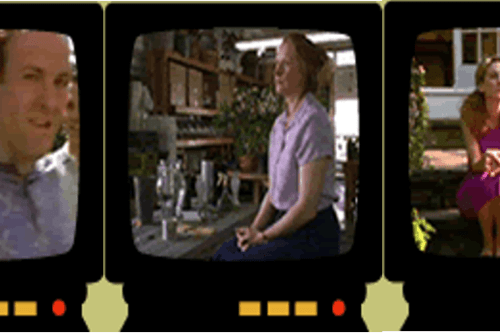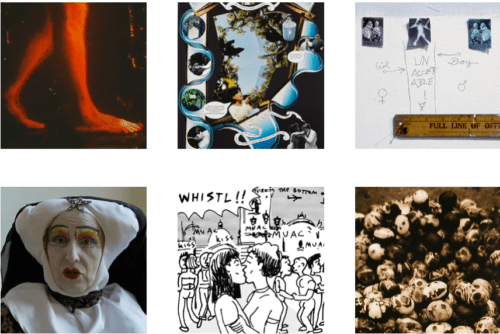
Throughout this episode, two stories are carefully interwoven. One narrative strand follows Tracee, a dancer at the Bada Bing! club, as she attempts to create a traditional family dynamic in her life. In the opening scene she approaches Tony with a gift of homemade date-nut bread, and later she entertains hyperreal fantasies of a future home life with Ralphie, the volatile gladiator-wannabe whose baby she is carrying. Her fantasies measure the extreme distortions produced by immersion in the ideology of family values, as she imagines their life as suburban, normal, loving, tidily poised at the end curve of a New Jersey cul-de-sac. Her actual experiences of the nuclear family as a violent space (her mother burned her hand on the stove when she was a child, and she repeats the act by burning her infant son with cigarettes) are erased by this media-driven nostalgia for home. The second narrative strand follows Meadow, Tony’s daughter, as she negotiates her first year at college. Meadow is sorting through romantic mythologies and imperfect relationship realities as she pursues sexual pleasure while trying to gauge her boyfriend’s commitment and trustworthiness. Her loss of virginity works as a counterplot to Tracee’s quest for domesticity. The “good” daughter becomes sexualized, as the “bad” stripper seeks the legitimacy of love, marriage, and baby carriage.
This parallel is deliberately crafted through twinned scenes and rhetorically pointed segues in which Meadow’s body fades into Tracee’s. In one scene Meadow and her mother, Carmela, have a conversation about Meadow’s biracial boyfriend. Carmela asks her daughter if she is in love with Noah. Meadow responds, “At this point I’d better be.” Carmela asks, “At what point?” Meadow demurs, “We are so not having that conversation.” In a previous scene we see Meadow under Noah as he unwraps a condom. Meadow is clearly referring to the birds-and-bees conversation that makes for such predictable humor in family television. In her most sardonic teenage knowingness, Meadow is not “going there” with Carmela, resisting the possibility of warm bonding, Gilmore Girls style. In the next scene, we see Tracee talking with Tony, reproducing the daughter/parent dyad of Meadow and Carmela, but instead of taking place in the cozy bedroom of the family home, this conversation happens outside the strip club, in the alienated space of a gravel parking lot. Where the Meadow/Carmela scene subverts our expectations for closeness, the Tony/Tracee scene parodies them in grotesque form. Tracee tells Tony she is pregnant, and that it is Ralphie’s baby. She is positioned in relation to Tony in this scene as a daughter figure, seeking advice and support, but as an unwed mother and a sex worker, she takes on the hybrid role of deviant daughter, doubling Meadow’s newly deflowered status.
These blurred boundaries between stereotypes enact the poststructuralist dictum that each pole is haunted and inflected by its supposed opposite. Tracee and Meadow hold within their separate social roles traces of the other, calling the good girl / bad girl binary of traditional Western thought directly into question. This move aligns the episode with the concerns of sex worker feminism. Jill Nagle, in Whores and Other Feminists, reminds her readers of a commonly noted point in sex radical feminism, that the whore stigma affects all women, shaping how we perceive and present ourselves. We must “not only be virtuous, but also . . . appear virtuous, to . . . demonstrate our affiliation with the privileged half of the good girl / bad girl binary” (5). The parallel between Tracee and Meadow dismantles this tenacious binary, constructing portraits of young women in the space between categories and asking, to borrow Nagle’s language, “what purposes are served by using any sexual categories to describe women” (4). Tracee’s status as whore seems to make her vulnerable to attack (Ralphie mentions it several times to excuse himself for killing her), but Tony recognizes Tracee and Meadow as the same, not as opposites. In the following episode Tony looks at Meadow and sees Tracee, suggesting that there is no “particular class of woman” (to paraphrase playwright Janet Feindel) who is suited to stripping or who is less deserving of safety and sexual freedom 1.
- Janet Feindel’s A Particular Class of Women, is published by Canada Playwrights Press in the anthology Singular Voices, distributed in the States by Theatre Communications Group. It was originally published on its own by Lazara Publishers, Vancouver, B. C. It has been produced in various theatres in the U.S. and Canada and most recently in Rome, Italy in English at the Teatro Inglese then in Italian at the Teatro Colesseo. There is also an article about the development of the play in Canadian Theatre Review.[↑]



